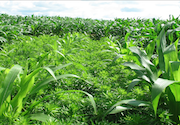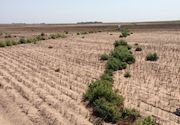| |
| |
 |
 |
| |
 |
|
MMMM d, yyyy |
|
| |
 OMAFRA staff share considerations for planting winter wheat in Ontario based on results from the 2018 Ontario Winter Wheat Performance Trials report, which compares varieties in managed (two fungicide applications) and unmanaged regimes.
» Read more...
OMAFRA staff share considerations for planting winter wheat in Ontario based on results from the 2018 Ontario Winter Wheat Performance Trials report, which compares varieties in managed (two fungicide applications) and unmanaged regimes.
» Read more...
Canadian farmers are anticipating increased barley production compared to 2017, while production of canola, wheat, soybeans, corn for grain, and oats are all expected to decline, according to Statistics Canada's July farm survey on field crop production.
» Read more...
Farm Management Canada and the Canadian Association of Diploma in Agriculture Programs are accepting applications for the 2018-19 Excellence Award for Agricultural Students.
» Read more...
|
| |
|
| |

Your photo could be featured on the cover of our December issue, our national edition that is distributed to farmers across Canada. Share what makes up your Top Crop - the challenges, successes and the ins and outs of your cropping season.
Show us your picturesque fields, the pesky insects you found this year, or your best photos from seeding and harvest. Photos will be accepted until October 24, 2018. Keep an eye out for additional prizes from our sponsor Meridian Manufacturing.
» Submit your photos here |
| |
|
| |
 Ontario is home to four of the six glyphosate-resistant weeds in Canada, and Peter Sikkema, professor at the University of Guelph Ridgetown Campus, remembers the day glyphosate-resistant Canada fleabane was found in Ontario. Sikkema explains how to control these resistant weeds across crops and glyphosate stewardship.
» Learn more
Ontario is home to four of the six glyphosate-resistant weeds in Canada, and Peter Sikkema, professor at the University of Guelph Ridgetown Campus, remembers the day glyphosate-resistant Canada fleabane was found in Ontario. Sikkema explains how to control these resistant weeds across crops and glyphosate stewardship.
» Learn more |
| |
 Group 4 herbicides, like dicamba and 2,4-D, are the third-most used mode of action. It’s often stated that Group 4 synthetic auxin herbicides have a lower incidence of resistance, with only a couple of reported resistant species, most notably kochia and waterhemp. But as the use of herbicides in this group increase, that may change.
» Learn more
Group 4 herbicides, like dicamba and 2,4-D, are the third-most used mode of action. It’s often stated that Group 4 synthetic auxin herbicides have a lower incidence of resistance, with only a couple of reported resistant species, most notably kochia and waterhemp. But as the use of herbicides in this group increase, that may change.
» Learn more |
| |
|
| |
|
|
| |
| |






